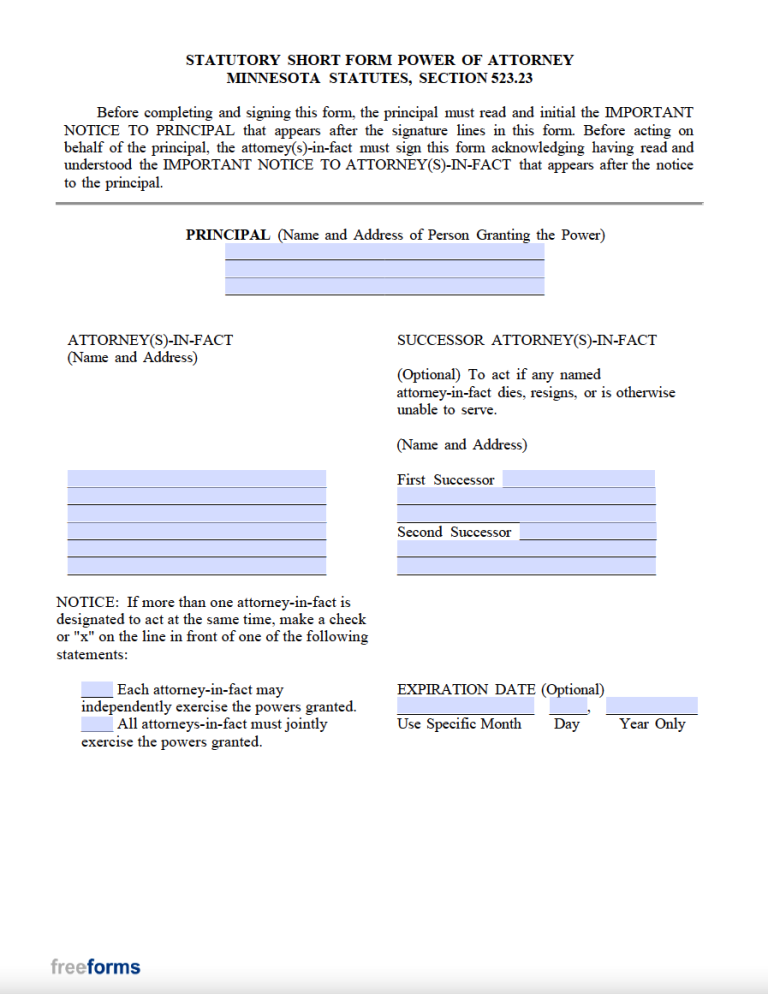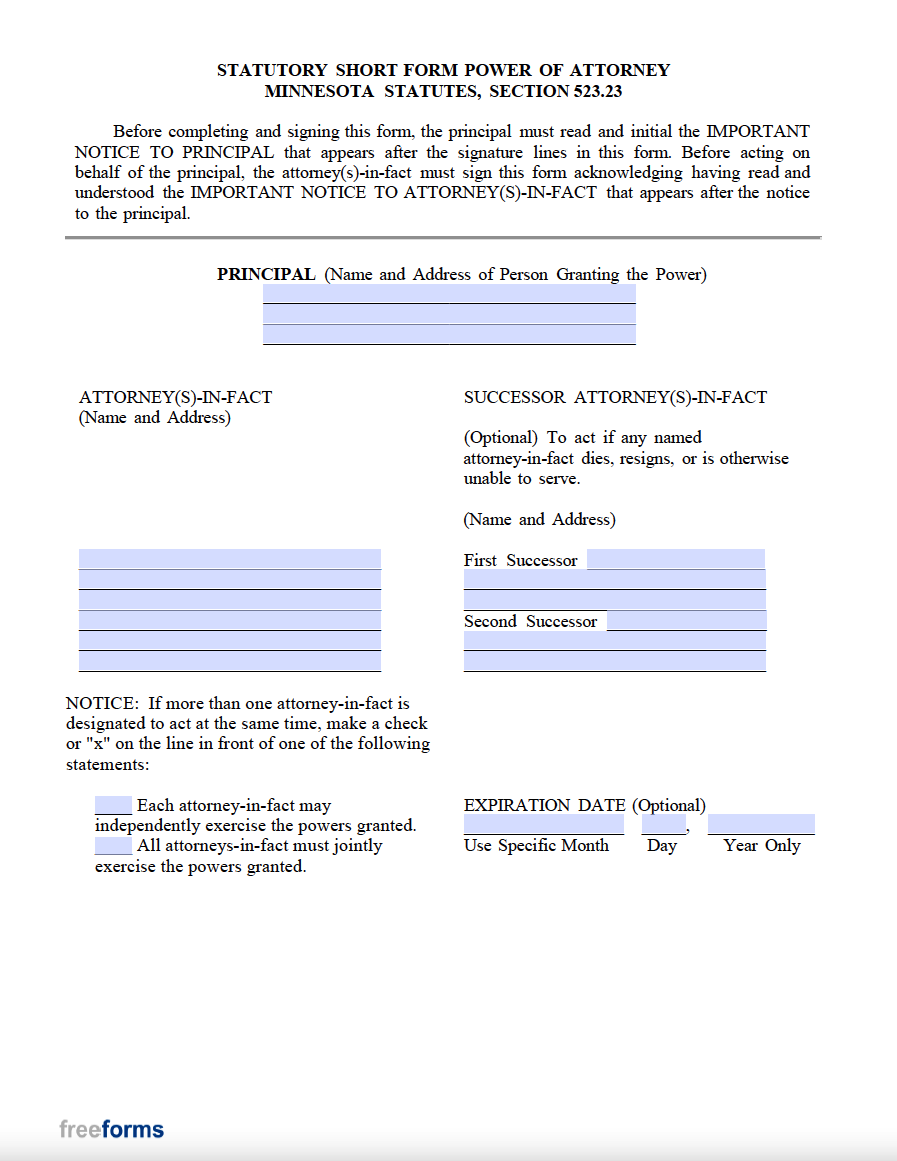Even though each document varies in terms of the powers that can be delivered, they still all require a similar method of execution. Appointing parties will have to indicate who is involved, what authority their agent will have access to, and what conditions are going to be applied to the arrangement. After establishing these elements, the principal will have to endorse the instrument along with attesting witnesses and/or a notary public.
Laws
Statutes – Chapter 523: Powers of Attorney
Definition – “As used in this chapter, ‘power of attorney’ means a validly executed power of attorney.” (523.03(3))
Statutory Form – § 523.23
Signing Requirements – In the case of a signature on behalf of the principal, by another, or by a mark, the acknowledgment of a notary public is required (§ 523.01). Even if the principal signs the document directly, it is still recommended to have the document notarized.
By Type (9)
- Advance Directive (Medical POA & Living Will)
- Durable (Financial) Power of Attorney
- General (Financial) Power of Attorney
- Limited (Special) Power of Attorney
- Minor Child Power of Attorney
- Motor Vehicle Power of Attorney
- Real Estate Power of Attorney
- Revocation of Power of Attorney
- Tax Power of Attorney
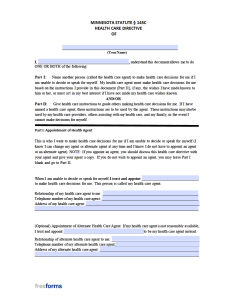 Advance Directive (Medical POA & Living Will) – Articulates how the principal wants certain things to occur regarding medical care at the time of incapacity.
Advance Directive (Medical POA & Living Will) – Articulates how the principal wants certain things to occur regarding medical care at the time of incapacity.
Download: PDF
Signing Requirements: Acknowledgment of Two (2) Witnesses and/or a Notary Public (§ 145C.03(1)(5))
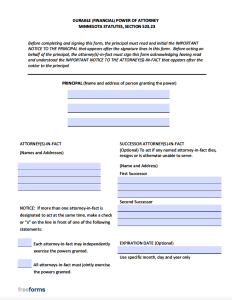 Durable (Financial) Power of Attorney – A document made for planning ahead, as it allows users to grant powers related to their assets that continue even if the principal falls into a state of unawareness.
Durable (Financial) Power of Attorney – A document made for planning ahead, as it allows users to grant powers related to their assets that continue even if the principal falls into a state of unawareness.
Download: PDF
Signing Requirements: A signature on behalf of the principal requires the acknowledgment of a notary public (§ 523.01).
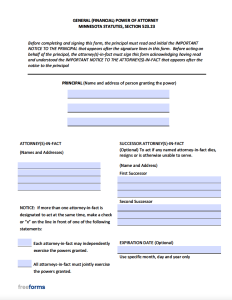 General (Financial) Power of Attorney – The non-durable POA for finances and property that ends upon the issuer’s incapacitation.
General (Financial) Power of Attorney – The non-durable POA for finances and property that ends upon the issuer’s incapacitation.
Download: PDF
Signing Requirements: A signature on behalf of the principal requires the acknowledgment of a notary public (§ 523.01).
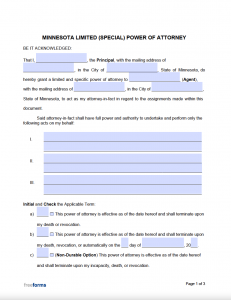 Limited (Special) Power of Attorney – Formatted to bestow a specific authority to an attorney-in-fact instead of granting more far-reaching powers.
Limited (Special) Power of Attorney – Formatted to bestow a specific authority to an attorney-in-fact instead of granting more far-reaching powers.
Download: PDF, Word (.docx)
Signing Requirements: A signature on behalf of the principal requires the acknowledgment of a notary public (§ 523.01).
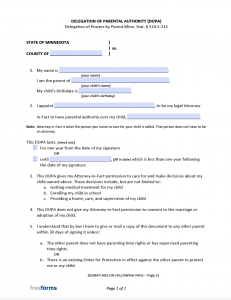 Minor Child Power of Attorney – Also known as the “Delegation of Parental Authority” (DOPA), this form allows an agent of the principal’s choice to temporarily watch over their child and provide the care necessary for their well-being.
Minor Child Power of Attorney – Also known as the “Delegation of Parental Authority” (DOPA), this form allows an agent of the principal’s choice to temporarily watch over their child and provide the care necessary for their well-being.
Download: PDF
Signing Requirements: Acknowledgment of a Notary Public
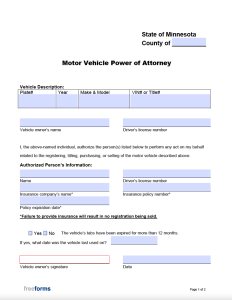 Motor Vehicle Power of Attorney – Enables an attorney-in-fact to handle personal duties relevant to the grantor’s automobile.
Motor Vehicle Power of Attorney – Enables an attorney-in-fact to handle personal duties relevant to the grantor’s automobile.
Download: PDF
Signing Requirements: A signature on behalf of the principal requires the acknowledgment of a notary public (§ 523.01).
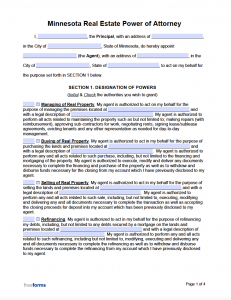 Real Estate Power of Attorney – This can be applied to scenarios where one person needs another individual to perform certain acts in their name related to real property.
Real Estate Power of Attorney – This can be applied to scenarios where one person needs another individual to perform certain acts in their name related to real property.
Download: PDF, Word (.docx)
Signing Requirements: A signature on behalf of the principal requires the acknowledgment of a notary public (§ 523.01).
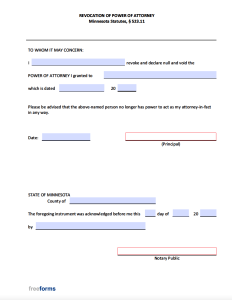 Revocation of Power of Attorney – Principals of an active POA can accomplish a copy of this instrument to nullify the content of the formerly executed document.
Revocation of Power of Attorney – Principals of an active POA can accomplish a copy of this instrument to nullify the content of the formerly executed document.
Download: PDF
Signing Requirements: A signature on behalf of the principal requires the acknowledgment of a notary public (§ 523.11(1)).
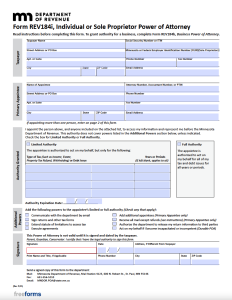 Tax Power of Attorney – Designed to authorize an agent to perform tax duties on your behalf.
Tax Power of Attorney – Designed to authorize an agent to perform tax duties on your behalf.
Download: PDF
Signing Requirements: Only requires the taxpayer’s signature.
